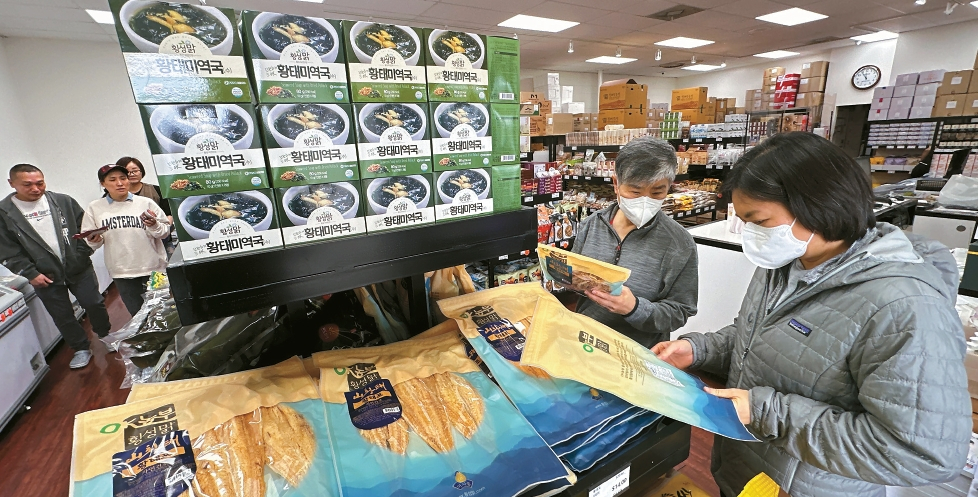Over the weekend, customers flocked to Gamjabow, a specialty store in LA’s Koreatown that focuses on products from Gangwon-do, a Korean province, to stock up on hwangtae (dried pollock).
The store reports that customers are purchasing in bulk, with one individual buying 10 bags of dried pollock and pollock roe—staples on Korean dinner tables—along with other processed pollock items, following South Korea’s announcement to suspend the export of these products. ‘Hotdeal’, the largest online Korean-American shopping mall in the United States, also reported a significant uptick in orders for dried pollock and pollock roe.

This increase follows the U.S. executive order issued on December 22 last year, which expanded the ban on Russian seafood imports to reinforce sanctions against Russia for its invasion of Ukraine.
Besides directly banning imports from Russia, the prohibition extends to Russian seafood processed in third countries, covering products such as pollock, cod, crab, and salmon.
The move will also halt the export of Korean seafood to the U.S., specifically items using Russian pollock, pollock roe, and salted pollock roe.
“The largest share of processed foods related to pollock is exported to the U.S.,” said Inseop Noh, head of the National Federation of Fisheries Cooperatives (NFFC)’s Los Angeles Trade Support Center. “We are looking for U.S. (Alaska) or Korean seafood instead of Russian for production, but it seems inevitable that prices will go up if that happens.”
In response, the LA Trade Center hosted a Zoom seminar titled ‘2024 U.S. Seafood Regulation Update’ on February 26, with 63 Korean exporter and importer companies participating. The seminar was organized to discuss responses to the new seafood restrictions while the Korean-American industry seeks countermeasures.
In January, Korean seafood exports to the U.S. had been steadily increasing, showing a 24 percent rise year-on-year. However, the abrupt suspension of imports of certain Korean processed seafood products to the U.S. took the industry by surprise.
The most sought-after processed foods made with Russian seafood ingredients and exported from South Korea to the U.S. include pollock roe, salted pollock, dried pollock, dried pollock soup meal kits, grilled pollock with marinade, cold noodle with pollock sashimi, and pollock roe soup.
The expected impact on the industry is significant, given that these foods are staples in Korean markets and officially sanctioned agricultural and seafood stores run by Korean provincial governments.
“Ninety percent of the dried pollock produced in Korea is from Russia, and major food companies exporting to the U.S. have yet to find a corresponding plan,” said Sangjoon Ahn, CEO of Gamjabow. “We have not placed any additional orders as the four-month supply we received in November will run out within the next month.”
Gwangwoo Choi, director of the Jeollanam-do U.S. office, which operates JN Mall, an online premium food store selling products of Jeollanam-do Korea, said, “We are still selling products from Russia, such as shredded dried pollock and pollock roe,” adding, “We are looking to diversify our raw material import lines for export to the U.S., such as Southeast Asia instead of Russia.”
Jayoung Park, a public relations representative at Wooltari, a Korean agricultural and fishery food market, said, “There are about 10 types of such products, and they are foods that were imported before January 1 of this year,” adding, “We are preparing Alaskan products for orders in March and April.” The purchasing team at Wooltari said that the price of Alaskan raw materials is generally higher than that of Russian products and when they are imported in large quantities, the price of processed pollock is expected to rise significantly.
Korean market seafood sections continue to offer Russian seafood, including half-dried pollock and atka mackerel. However, Youngkyo Kim, director of LA Hannam Chain, said, “Our stock of pollocks is from Alaska. With ample inventory still available at seafood wholesalers, the current impact is minimal.”
BY EUNYOUNG LEE, HOONSIK WOO [lee.eunyoung6@koreadaily.com]




